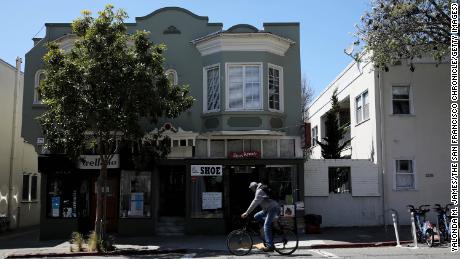"I'm, like, supposedly successful according to American standards," said Escudero, who works as a home health aide. "I was born and raised here. I have a college degree, I speak English — and I'm unable to pay rent. To me, that's ridiculous."The cost of housing in the US has risen faster than wages for decades. But the problem is particularly bad in California, where a housing shortage and rising rents have forced tens of thousands of people onto the streets and into shelters.The shortage of housing, Escudero said, "is really immoral, inhumane, and unjust." And, "it's become even more immediate now with Covid-19. We cannot wait years in order to get secure housing when there's people now literally dying on the streets and spreading this pandemic."Escudero is part of a group of housing activists called The Reclaimers, who this spring identified roughly 200 empty houses that had been purchased by the California government for a highway project that had been recently canceled. The Reclaimers took over 13 homes — without a lease and without permission from the state — giving each one to a family in need of a place where they could live and safely social distance.Caltrans, the California agency that owns the homes, sent a letter to The Reclaimers that was seen by CNN that said it "does not consent" to the group's occupancy of the properties and has asked them to leave. But Caltrans added it, along with local lawmakers, is willing to help them find a place to live. While most housing activists aren't seizing homes, many are pushing landlords and governments to offer relief to renters and to do it fast in the face of the coronavirus pandemic.There are 500,000 people who are homeless in America, but millions more are housing insecure — meaning they spend a large portion of their income on their rent or mortgage, or they are living in overcrowded spaces or poor conditions. Even before the pandemic, one in four US renters spent more than half their income on rent in 2018, according to a Harvard study. "These households can't build up any kind of savings, any rainy day fund, which means that as soon as they lose hours or lose a job, they just can't pay their basic monthly bills," said Jenny Schuetz, a fellow at the Brookings Institution, who studies urban economics and housing policy.For the millions of workers who've lost jobs due to shutdowns related to the coronavirus, this has become a stark reality. The federal government sent stimulus checks to people earning $99,000 or less and couples earning below $198,000, and put a 120-day moratorium on evictions for most renters in federally subsidized apartments or homes covered by federally-backed mortgages. Some state and local governments have also offered some relief to renters.But for thousands of housing activists around the US, however, those efforts are not good enough. "In saying 'cancel the rent,' we're saying cancel not only the rent during this period — which, we have no idea when this period will end, right? But also cancel all debt related to that rent. Meaning, cancel it, and we don't owe you anything," housing activist Kerbie Joseph explained.Joseph said it's not enough to pause evictions, or pause rent, only to have multiple months of payments come due at once when society and business reopens. She helped organize a rent strike in New York on May 1, with the goal of pushing politicians to do more to protect the housing of people who cannot work right now.Rep. Alexandria Ocasio-Cortez endorsed canceling the rent in late April. In a recent interview with Vanity Fair, DemocRead More – Source
"These households can't build up any kind of savings, any rainy day fund, which means that as soon as they lose hours or lose a job, they just can't pay their basic monthly bills," said Jenny Schuetz, a fellow at the Brookings Institution, who studies urban economics and housing policy.For the millions of workers who've lost jobs due to shutdowns related to the coronavirus, this has become a stark reality. The federal government sent stimulus checks to people earning $99,000 or less and couples earning below $198,000, and put a 120-day moratorium on evictions for most renters in federally subsidized apartments or homes covered by federally-backed mortgages. Some state and local governments have also offered some relief to renters.But for thousands of housing activists around the US, however, those efforts are not good enough. "In saying 'cancel the rent,' we're saying cancel not only the rent during this period — which, we have no idea when this period will end, right? But also cancel all debt related to that rent. Meaning, cancel it, and we don't owe you anything," housing activist Kerbie Joseph explained.Joseph said it's not enough to pause evictions, or pause rent, only to have multiple months of payments come due at once when society and business reopens. She helped organize a rent strike in New York on May 1, with the goal of pushing politicians to do more to protect the housing of people who cannot work right now.Rep. Alexandria Ocasio-Cortez endorsed canceling the rent in late April. In a recent interview with Vanity Fair, DemocRead More – Source
[contf] [contfnew] 
cnn
[contfnewc] [contfnewc]






